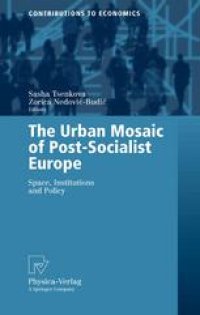
Ebook: The Urban Mosaic of Post-Socialist Europe: Space, Institutions and Policy
- Tags: Regional Science, Landscape/Regional and Urban Planning, Regional and Cultural Studies, Political Science, Human Geography, European Integration
- Series: Contributions to Economics
- Year: 2006
- Publisher: Physica-Verlag Heidelberg
- Edition: 1
- Language: English
- pdf
The book explores urban dynamics in post-socialist Europe 15 years after the fall of communism. The ‘urban mosaic’ metaphor expresses the complexity, diversity and uniqueness of the processes and spatial outcomes in post-socialist cities. The book examines the urban development and the policy and planning processes that have resulted from the socio-economic, political, and institutional transformations characterizing the move to markets and democracy. The emerging urban phenomena are illustrated with in-depth case studies, sensitive to historical themes, cultural issues and the socialist legacy. Cities featured in the book include: Kazan, St. Petersburg, Moscow, Warsaw, Prague, Komarno, Budapest, Belgrade, Bucharest, Sofia and Tirana. The edited volume is organized around the following four themes: the driving forces of post-socialist change; urban processes and spatial change; housing and retail sector transformation; and urban planning and policy responses.
"This volume provides an impressive overview of the dramatic transformations in the urban fabric and housing systems of post-socialist Europe". Larry S. Bourne, Professor of Geography and Planning, University of Toronto
"This text is a brave attempt to bring together a range of understandings of how urban systems are developing in post-socialist Europe, using both comparative data across countries and case studies of individual cities." Christine Whitehead, Professor of Economics, London School of Economics
The book explores urban dynamics in post-socialist Europe 15 years after the fall of communism. The ‘urban mosaic’ metaphor expresses the complexity, diversity and uniqueness of the processes and spatial outcomes in post-socialist cities. The book examines the urban development and the policy and planning processes that have resulted from the socio-economic, political, and institutional transformations characterizing the move to markets and democracy. The emerging urban phenomena are illustrated with in-depth case studies, sensitive to historical themes, cultural issues and the socialist legacy. Cities featured in the book include: Kazan, St. Petersburg, Moscow, Warsaw, Prague, Komarno, Budapest, Belgrade, Bucharest, Sofia and Tirana. The edited volume is organized around the following four themes: the driving forces of post-socialist change; urban processes and spatial change; housing and retail sector transformation; and urban planning and policy responses.
"This volume provides an impressive overview of the dramatic transformations in the urban fabric and housing systems of post-socialist Europe". Larry S. Bourne, Professor of Geography and Planning, University of Toronto
"This text is a brave attempt to bring together a range of understandings of how urban systems are developing in post-socialist Europe, using both comparative data across countries and case studies of individual cities." Christine Whitehead, Professor of Economics, London School of Economics